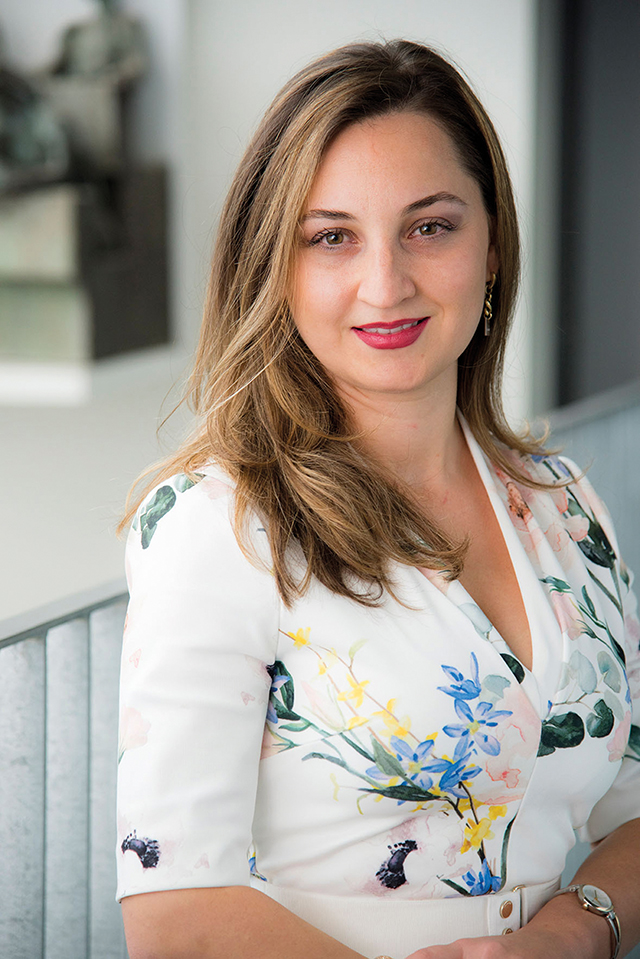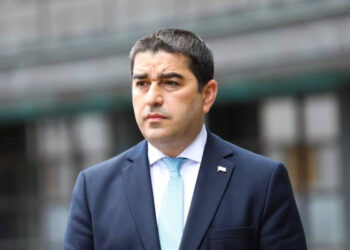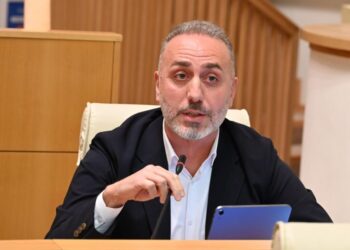In the history of EU-Georgia relations, it’s always the EU who has to come give us new ideas. We’re showing precious little initiative and invention: we need more strategic and innovative thinking
With Belarus seemingly out of the equation until a change of power in Minsk, and Georgia’s two South Caucasus neighbors preferring a less hands-on integration and cooperation process with Brussels, it was perhaps a little surprising that Georgia, Moldova and Ukraine ended up forming a trilateral alliance, aptly dubbed the “Association Trio”. Their main objective is joint action and cooperation in all matters of European integration, an issue of strategic, and of perhaps almost existential, importance for all three nations, especially with Georgia preparing its bid for full EU membership in 2024.
Following their respective ministers signing a memorandum last month in Kyiv, this week saw the presidents of the three countries holding the inaugural trilateral meeting in Batumi. But whether the format ends up a potent tool in Georgia’s arsenal remains to be seen, says Teona Lavrelashvili, Project Manager of the European Party Monitor, KU Leuven, and a former policy officer at the European Commission, DG NEAR, with whom GISP discussed both Georgia’s EU membership bid and the prospects of the new TRIO format.
We began our interview by asking her for her take on Georgia’s announced 2024 bid for EU membership, noting that many Western commentators, including members of the European Parliament, had expressed skepticism about the potential success of such a bid.
“I think that this EU membership application has both pros and cons. Let’s start with the advantages, which are few and far between, sadly,” she tells us. “Applying for membership puts Georgia on the EU agenda, and revives interest in the issue of the country’s European perspective. The EU decision-makers will have to discuss it, and, actually, nobody can deny that Georgia has European perspective, because it is within the European continent, and it is eligible to apply for EU membership.

We shouldn’t be making reforms for the EU, we don’t want to advance our economy to please the EU; we are doing it for ourselves, for our nation. Unless this is communicated clearly to society, this is bound to end in more disappointment
“However, timing is everything in politics, and I think the timing [of this announcement] wasn’t good. First of all, nobody’s naive enough not to realize that this decision doesn’t come without an internal politics layer attached to it, aiming to score points ahead of the elections. Secondly, to my knowledge, there was precious little consultation held on this matter between the Georgian side and its European partners: it basically came out of blue and caught Brussels unaware. The MEPs, as well as other stakeholders, did not really seem thrilled about the idea; they did not show their immediate support; they were even a bit confused. This could and should have been better prepared. The problem is not that we are overly ambitious – its fully within our rights to apply for membership; the problem is that we gauged neither the opinion of the member states nor the decision makers in Brussels, and there was no strategic approach to convince our partners to follow up on our requests.
“This is definitely a milestone moment for Georgia, and I think we could have been more strategic. If you look at the process of granting countries candidate or potential candidate status, first you realize it’s quite a bureaucratic process- you won’t get the desired status unless you have consensus in the European Council. And Georgians know full well that at this moment it’s almost impossible to get this consensus because of a number of factors, among them enlargement fatigue, apparent now in the prolonged EU integration of the Balkans, being one of the most prominent.
“There’s a new methodology for assessing potential candidates, and this new methodology focuses on the rule of law, on the increasing power of the member states to veto everything concerning the enlargement, and, knowing all this, Georgia applying for full membership and being granted its request in 3 years’ time is simply not realistic. We need to lower our expectations a notch. Sure, we all want Georgia to be a member of the EU, but we have to be clever and find ways to get closer, i.e. with enhanced cooperation as well as institutional integration.”
Would it be fair to argue that it’s quite a risky move? Can it bring more harm than good? It can give the skeptics both at home and abroad an opportunity to point the finger and say – see, you’re not wanted.
Well, although it contains some risks, I hope that further events will unfold in a way that Georgia could benefit more. Our membership application now may put the EU in an uncomfortable situation to say yes or no on Georgia’s candidate or potential candidate status. Instead, we could have used, hopefully we still can use, this TRIO format to come up with a joint request for membership or other institutional status. Georgia could have said, “Listen, guys, now we have this TRIO format. We’re ambitious, but we are also realistic. We know that getting this candidate status is unrealistic, so what can we do? Can we actually ask for something different, like special status?” Something like that would actually give Georgia more room to maneuver. Looking at the history of EU-Georgia relations, it’s always a top-down approach; it’s always the EU who has to come and give us a nudge or some new ideas. We’re showing precious little initiative and invention, and we need more strategic and innovative thinking in that respect.
Another problem, I believe very much rooted in the political discourse, is that we always seem to be laboring under the unshakable impression that EU membership is a rasion d´etre for our nation, something that will cure us of all our ills. We shouldn’t forget that while EU integration is a means to support a welfare state with human rights, rule of law, and democracy, these are not exclusively European values: they are universal values. At the end of the day, we shouldn’t be making reforms for the EU, we don’t want to advance our economy to please the EU; we are doing it for ourselves, for our nation. Unless this is communicated clearly to society, all this is bound to end in more disappointment. We need to tell to our citizens the truth, and the truth is that by becoming a member of the EU, let’s say by 2030, it doesn’t automatically mean that we will be living with the same standards as EU member states are living.
The EU is becoming more diverse in many aspects, and prospects of differentiated levels of integration within the EU are becoming more realistic.
Thus, Georgia should be prepared for multiple scenarios, and should show its creative approach on its EU integration path by using the possibility of enhanced cooperation together with its TRIO partners.
On to the TRIO format. What are the pros and cons of this new platform? What do we get to do together?
I overwhelmingly welcome this initiative, after all, I have personally advocated for this idea since 2018 from the think-tank platform. Yet, before the Batumi Conference, little was known about the concept behind it, a fact which also made some EU institutions and particularly the European External Action Service quite skeptical. But Despite the EU’s fears of differentiation, it is becoming natural that TRIO emerges as more homogenous states with common strategic foreign interests.
Furthermore, with Michel’s green light, it’s clear that the TRIO initiative has overcome the skepticism and laid a foundation for a more legitimate platform. In the TRIO declaration, we now see (at least) part of the concept behind TRIO initiative. Yet, the “how” question is not clear, particularly the mechanism of its implementation and institutionalization. Perhaps the key is having sustained efforts and creativity from all sides involved, and, of course, strategical communication with not only Brussels but also the EU member states.
It is obvious that we need to increase our strategic communication efforts with Brussels and with the EU member states. One of the idea could be creating a TRIO policy advisory group. The countries of the Western Balkans also use this type of advisory policy group between themselves to coordinate their efforts on an opinion-making basis. I think that something could be also done in the case of Georgia, Ukraine, and Moldova, seeing policy experts and academia unifying their efforts in terms of giving conceptual analysis and providing strategic depth.
The undisputed advantage of the TRIO format is that, without excluding bilateral cooperation with the EU, the success of each separate country out of the three will have a positive impact on the remaining two. So, if out of the three students, one is exceptionally good and the other two are not performing well, we, as a team, will still win.
In international politics, numbers do matter, though. You might be the success story, but you are still one country. But then, if you are forming a block like Georgia, Moldova and Ukraine, and you are asking the EU for something, you will have more leverage and more negotiating power.
Would it be wishful thinking to hope that the TRIO, if it proves efficient, could enhance Georgia’s resilience against Moscow and its constant stream of malign influence?
We should have both feet firmly on the ground, so to speak – the Russian factor is there, and unpleasant and destructive as it is, unfortunately it’s there to stay, and we should expect that Russia will continue to use all leverage at its disposal, including, of course, its soft power to distort our EU path. We all remember how hostile Russia was towards the Eastern Partnership, and this TRIO format will be seen by Russia as another attempt to undermine the Russian influence on Georgia, Ukraine and Moldova. I believe and I hope that our resilience towards Russian malign influence will strengthen by strategically using the TRIO format, and that we will be able to design some joint actions and approaches to restrict Russia’s interference in our domestic politics. Yet, in order to strengthen our resilience, it is essential that the three countries embark on continuous a reform agenda on the one hand, and that the political actors from government and opposition increase political responsibility and constructive behavior on the other. There is no time to be lost in superficial political struggles: instead, narrow party interest should be put aside in order to focus on a real goal – that is building a successful nation state.
Interview by Vazha Tavberidze














